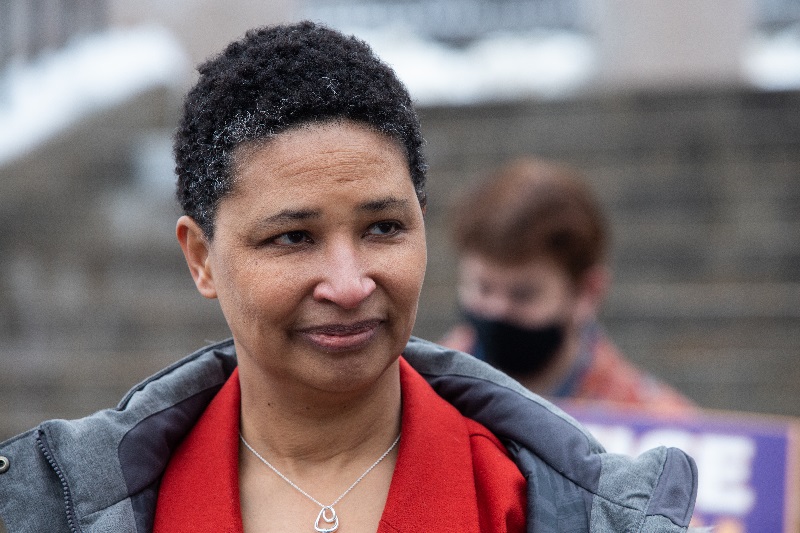latest
Allen urges drug use decriminalization, treatment proposal in Massachusetts

By Chris Van Buskirk
STATE HOUSE, BOSTON, FEB. 2, 2022…..Personal use of controlled substances like heroin or cocaine would be decriminalized and access to in-patient substance use disorder treatment beds would be expanded under a plan Democratic gubernatorial candidate Danielle Allen unveiled Wednesday morning.
Describing it as a first for a candidate running for governor of Massachusetts, Allen’s campaign said her plan seeks to reframe how people view addiction and recovery.
At a press conference outside the State House, Allen said she was inspired to pursue criminal justice reforms in honor of her cousin, who she said was shot and killed after serving prison time for attempted carjacking charges.
“That was just a deeply hard moment for my whole family. There are too many stories like this in our country. It was a life turning point moment for me,” she said. “I also just started beating my head against the question of why are we so bad at helping so many young people make a transition to a healthy adulthood.”
Allen is seeking a limited civil fine for personal drug use and possession charges which could be waived if a person participates in a screening to identify treatment needs. That’s similar to legislation from Reps. Mike Connolly (D-Cambridge) and Liz Miranda (D-Roxbury) which sets a maximum civil fine of $50 for illegal possession of a controlled substance while allowing similar treatment screenings.
The plan does not say which specific drugs would be decriminalized, though a campaign spokesperson said Allen is targeting any personal use drugs that can lead to jail time like opioids, cocaine, and heroin.
Sen. Sonia Chang-Diaz, a Jamaica Plain Democrat who is also running for governor, said she is open to considering decriminalization as a way to combat the opioid crisis.
“We should start by increasing access to treatment, growing the workforce of providers, shifting resources from prisons into community development, and expanding low-threshold housing to help people facing addiction get stabilized and access wrap-around services,” she said in a statement to the News Service.
Allen wants to expand support and treatment resources “so that we’re meaningfully replacing a criminalization system with better access to low-barrier treatment and supportive housing, destigmatization, and broader support for health and recovery,” she said in a statement before the press conference.
That includes increasing the availability of overdose-reversing medication like Naloxone, addressing the stigma around medication, and promoting education on its use. Allen said her administration would seek to have Naloxone and similar products covered by “all insurances, using federal funds available to support these types of programs.”
“Throughout the Baker-Polito administration, five people have died every day of opioid overdoses, and the crisis appears to be worsening by the day,” an announcement outlining the plan said. “But across our commonwealth, people who need treatment and support for substance use issues of all kinds are getting jail time instead.”
Massachusetts in 2018 passed legislation expanding access to medication-assisted addiction treatment, including allowing people to obtain Narcan without a prescription.
Under that law, Massachusetts retail pharmacies are required to keep a sufficient supply of naloxone rescue kits on hand. MassHealth covers the cost of the drug for members, as do other insurers, according to the state.
The most recent report from the Department of Public Health found a total of 1,613 people died from fatal overdoses between January and September 2021 while 2,106 people died of overdoses in 2020.
Baker addressed his administration’s efforts to combat the opioid crisis in Massachusetts during his State of the Commonwealth speech last week, saying the state “became a national leader in the fight against opioid addiction.”
Attorney General Maura Healey, who is running for governor in 2022, applauded Baker’s remarks, pointing specifically to mental health issues the governor addressed.
“I really was happy to hear him talk about mental health and continuing to work on more resources and investment. That was really great,” Healey said.
Asked about Allen’s proposal to decriminalize drug use, the Healey campaign emailed a more general statement.
“Maura is committed to continuing to combat the devastating opioid crisis, which requires a focus on prevention, harm reduction, treatment, and holding pharmaceutical and other companies accountable for their roles in causing this crisis in the first place,” said campaign spokesperson Karissa Hand. “She has been guided by families most deeply impacted by the opioid crisis every step of the way. Their voices will continue to guide her approach as Governor.”
Dr. Vaughan Rees, director of the Center for Global Tobacco Control at Harvard University, said substance use issues are a health and social problem, not a criminal one. This, he said, has become more clear to the general public as opioid overdose deaths in the state have persisted.
“We now have abundant high quality evidence which shows us that when we engage people who use drugs meaningfully, sincerely to provide appropriate care and social services, it not only improves the health and well being of those individuals, it saves governments money,” Rees said.
Allen is also looking to expunge criminal records of non-violent, personal-use drug offenses to make it easier for people who served time in prison to find jobs and rebuild their lives. And her plan alludes to creating overdose prevention centers in communities and alternative 911 responses at the municipal level.
“We have been trying to deal with the challenge of substance use disorder by criminalizing addiction. This does not work,” Allen said. “The evidence is very clear, criminalization produces stigma. It means young people don’t put up their hands and ask for help. My cousin did not put up his hand and ask for help.”







You must be logged in to post a comment Login